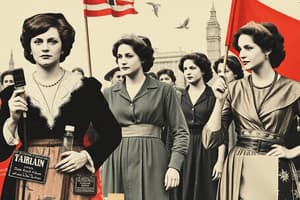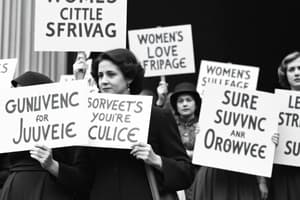Podcast
Questions and Answers
What was a primary focus of the female 'clubs' that emerged in the late nineteenth and early twentieth centuries?
What was a primary focus of the female 'clubs' that emerged in the late nineteenth and early twentieth centuries?
- Developing women's sports leagues
- Political lobbying to reduce crime
- Intellectual development and philanthropy (correct)
- Establishing educational institutions for women
Which of the following organizations was founded in 1896 and aimed to uplift Black women and address civil rights?
Which of the following organizations was founded in 1896 and aimed to uplift Black women and address civil rights?
- National Women's Party
- National Association of Colored Women (correct)
- General Federation of Women's Clubs
- Women's Christian Temperance Union
What role did Carrie A. Nation play in the reform efforts of her time?
What role did Carrie A. Nation play in the reform efforts of her time?
- She led abolitionist efforts for Black women.
- She organized women to participate in suffrage marches.
- She campaigned against alcohol by destroying saloons. (correct)
- She established the first women’s rights club.
Which movement did many white women's clubs struggle to include Black women due to rising American prejudice?
Which movement did many white women's clubs struggle to include Black women due to rising American prejudice?
What characterized the General Federation of Women's Clubs and the National Association of Colored Women in terms of their membership?
What characterized the General Federation of Women's Clubs and the National Association of Colored Women in terms of their membership?
What was the primary reason cited for the dismissal of charges against Nation?
What was the primary reason cited for the dismissal of charges against Nation?
Which major initiative did Frances Willard NOT focus on during her time as the leader of the WCTU?
Which major initiative did Frances Willard NOT focus on during her time as the leader of the WCTU?
How did the WCTU describe alcohol in their campaigns?
How did the WCTU describe alcohol in their campaigns?
What was one effect of associating alcohol with various social ills, according to the content?
What was one effect of associating alcohol with various social ills, according to the content?
Which of the following best describes Jane Addams' reputation among American reformers?
Which of the following best describes Jane Addams' reputation among American reformers?
Flashcards are hidden until you start studying
Study Notes
Women's Activism and Reform
- The Reform era opened new avenues for women's activism in American public life, boosting the suffrage movement.
- Women’s clubs became prominent social organizations, focusing on intellectual growth and community philanthropy during the late 19th and early 20th centuries.
- National women’s club federations emerged in the 1890s, with significant ones being the General Federation of Women’s Clubs (1890) and the National Association of Colored Women (1896).
- These federations were predominantly composed of upper-middle-class, educated white women, leading to racial tensions and limited biracial participation.
- Black women established their own organizations focused on civil rights and the upliftment of their communities, such as those led by Mary Jane Richardson Jones and Josephine St. Pierre Ruffin.
- The National Association of Colored Women, formed by activists including Mary Church Terrell, sought to secure suffrage and challenge discrimination.
Contributions through Moral Reform
- Many women engaged in moral reform through churches and organizations aimed at improving American society.
- Carrie A. Nation became a notable figure for her aggressive stance against alcohol, famously destroying saloons with a hatchet, which gained national attention.
- Nation’s actions, while headline-grabbing, were not broadly followed by other women activists, who preferred more organized approaches.
- The Woman's Christian Temperance Union (WCTU), founded in 1874, initially aimed at temperance but transformed into a prominent political body under Frances Willard’s leadership from 1879 to 1898.
- The WCTU advocated for various reforms including urban poverty alleviation, prison reform, child labor laws, and women’s rights, with a strong emphasis on temperance.
- Alcohol was linked to social issues like domestic abuse and poverty, with the WCTU branding it a "home wrecker" and associating it with urban and immigrant communities.
- Reformers believed abolition of alcohol would lead to societal improvement, lower crime rates, and better living conditions for women and children.
Notable Reformers
- Jane Addams emerged as a leading figure in the reform movement, celebrated for her innovative approach and significant contributions to social welfare.
- Addams's background included personal tragedy, with the loss of her mother at a young age, influencing her future endeavors in community service and activism.
Studying That Suits You
Use AI to generate personalized quizzes and flashcards to suit your learning preferences.




